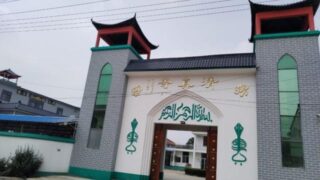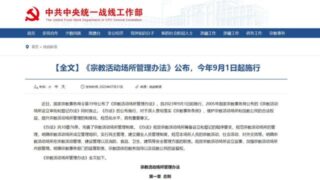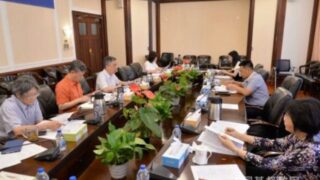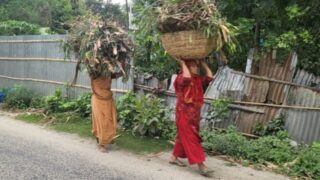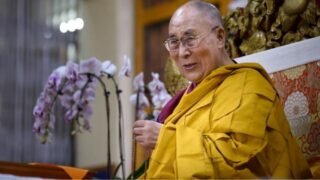“President Xi Jinping hates to see crosses,” declare authorities, as they clamp down on places of worship, in preparations to host the sports event in October.
by Cai Congxin
On October 18-27, Wuhan, the capital of China’s central province of Hubei, will host the 7th Military World Summer Games, a multi-sports event, organized every four years by the International Military Sports Council. It is planned that nearly 10,000 active-duty military personnel from over 100 countries will come to Wuhan to compete for medals.
Ahead of the games, the local government is carrying out a comprehensive purge of Christian house church venues, Buddhist temples, and other religious venues under the pretext of “maintaining stability.”
Multiple house church venues shut down
In late April, accompanied by the police, officials from a sub-district office in Wuhan raided a Panshi Christian Church meeting venue. The imposters didn’t present any documentation and registered the ID information of the congregation members.
“The Military World Games will be held soon. The central inspection team is now focusing on cracking down on religion. You cannot continue holding gatherings in the future,” a sub-district office official told the director of the church, closing down the venue.
The director has previously applied for a religious venue registration permit, but the local authorities turned him down every time. “If the Communist Party says that you’re legal, then you’re legal; if it says you’re illegal, then you’re illegal,” the director recounted the words by one of the officials.
A congregation member said that it is impossible to reason with the government now. “If we try, we will be arrested and detained. We’re sheep, and they’re wolves,” the believer complained.
In late May, the government ordered to cease gatherings at another house church in Wuhan – Dengguang Church. The church’s pastor argued with the officials who came to close down the church, saying that the Chinese Constitution guarantees the freedom of belief, and the new Regulations on Religious Affairs should not supersede it. “You’re suppressing us,” the pastor told one of the officials, to which he replied: “In China, everything has to be done following the Regulations on Religious Affairs. Don’t talk about the Constitution anymore. You should follow the Party.


The venue was ordered to be cleared out within two days. The pastor wanted to rent a new property for the church to continue assembling, but all landlords that he approached refused because the government prohibits renting to believers.


During the same period, Jia’en Church in Wuhan’s Qingshan district was also shut down, and all its religious symbols, including the cross, were torn down.


The authorities repeatedly harassed a house church meeting venue in Huangpi district from March to May. Eventually, the church’s cross was dismantled and destroyed, and the place was shut down.
“The state will be hosting the Military World Games, and Xi Jinping will pass through here. He hates to see any crosses,” a local government official explained the reason for closing this venue. He also commanded to the director of the church to obey the Communist Party – even if it is mistaken sometimes. If the director continues opposing the authorities, then the meeting venue will be demolished, and she will be fined.
In May, two house church meeting venues in Wuchang district’s Shidong sub-district were also shut down.
Buddhist temples sealed off, nuns and monks driven away
In late March, a government official from Wuhan’s Huangpi district came to Fuhui Temple and started yelling at the nuns: “The state will be hosting the Military World Games. The temple isn’t allowed to be open to the public, its doors must be sealed off, and Bodhisattva statues moved out. Buddhist nuns aren’t allowed to stay at the temple.”


Shortly afterward, the government official ordered the temple’s owner to convert the temple into an elderly activity center, threatening to demolish the building if he disobeyed. Having no other choice, he was forced to agree and told the Buddhist nuns to leave the temple.
On April 1, the district government mobilized more than 100 personnel, including the special police, to block off the intersections leading up the mountain where the temple was located. All statues of Buddhist deities were hauled away from the temple.
“The government came prepared; they even brought ambulances. The common people don’t dare to say anything about it. There is nothing we can do!” said a village resident.
Around the same time, the government also sealed off a Guanyin temple in Huangpi district. The temple’s Bodhisattva statues were cleared out, and monks who resided at the temple were driven away. Evicted from the temple, its owner, who had lived there for 22 years, was left homeless, nowhere to go.
“The government prohibited people from burning incense or worshipping Buddha. This is just like the Cultural Revolution. The CCP wants to eliminate all religious beliefs,” a villager commented angrily.



